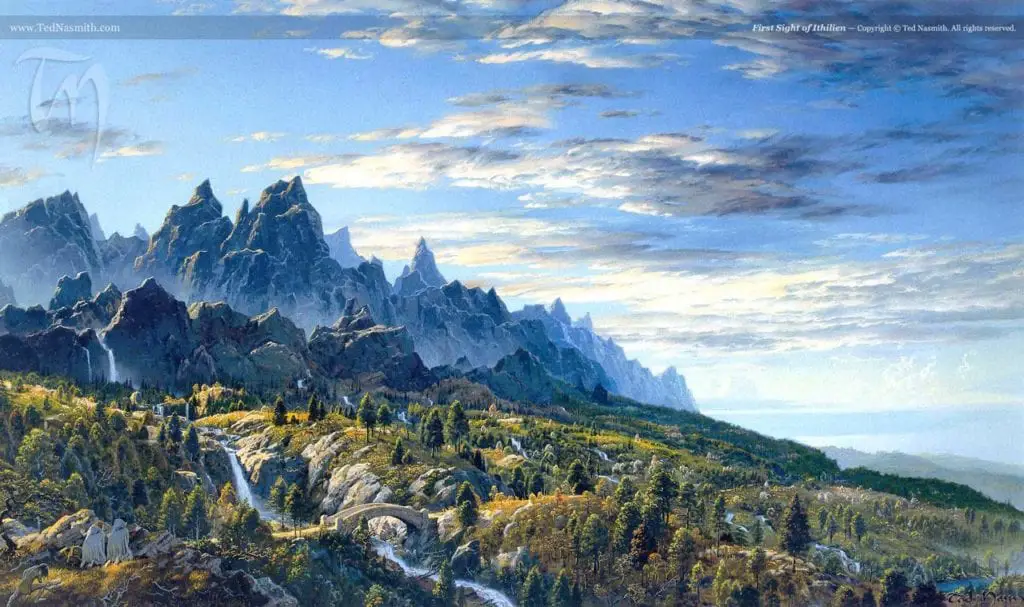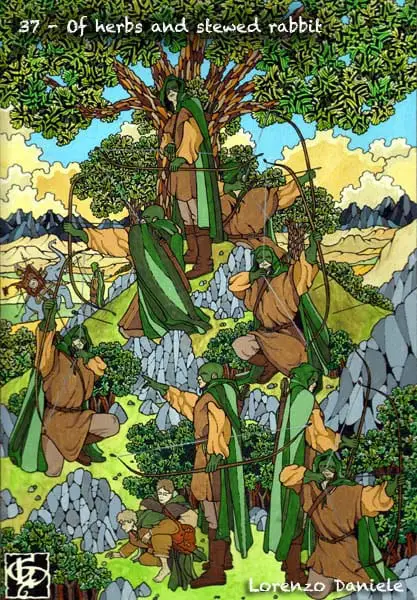When we began Book IV in our re-read project, I remember some discussion on its place in the series. Some people (me!) saw it as a series high point. Others saw it as… lots of walking. Especially after the sometimes-frenetic pace of Book III. And I can see where they’re coming from. “Of Herbs and Stewed Rabbit” and “The Black Gate is Closed” are both a bit lackadaisical in their pacing. Both cover emotional and psychological ground comparable to “The Passage of the Marshes.” There is, indeed, a lot of walking. But it’s also such an interesting, intimate part of the story. It’s been filled with quiet, small details and moments. There are big ideas constantly percolating under the surface. And it still feels to me like the core of The Lord of the Rings as a whole.*
Into Ithilien
A while back, I feel like there were a lot of Where in Middle Earth would YOU Live?? quizzes on the Internet. There was a variety, but it was pretty much what you’d expect: The Shire, Rivendell, Edoras, Lothlórien, Minas Tirith. I’m a Shire girl at heart, but there is a part of me that’s always tempted to pick Ithilien, “a fair country of climbing woods and swift-falling streams.” It’s such a lovely breath of fresh air after three straight chapters of Frodo and Sam lugging themselves through lands that are various shades of dead. The narrative so far has moved from the stony rocks of Emyn Muil to the rotting swamps of the Dead Marshes to the desolation before the Black Gate. Then with Gollum’s offer and Frodo’s decision, it plunges south into a garden.
Ithilien is beautiful in a wild, overgrown-garden kind of way. There are “somber trees like dark clouds” amid a “tumbled heathland.” They’re arriving in spring, as everything is bursting to life and spilling over the worn-down path. Nearly all the plants feel different: tamarask, terebinth, broom and cornel. A quick google tells me that Tolkien plucked most of these species from the eastern Mediterranean, a vibe much different than the Anglo-Celtic feeling associated with much of Middle Earth. But Frodo and Sam recognize it. Despite its differences, it reminds them of “The uplands of the Northfarthing, far away.” It’s brilliant and fragrant and heady, a strange mixture of foreign and familiar.

There’s also an interesting moral component to the landscape of Ithilien. It feels at first very much like a simple respite for Frodo and Sam. Some nice landscape variety between Morannon and Cirith Ungol. Or a time for Frodo and Sam to feel a nice bit of home before they head into Mordor. It feels relatively safe, and comfortable. But then, of course, Sam finds a pile of charred and broken bones. It’s not a huge moment, and Sam pushes past it with his persistent hobbit resolve. But it’s still a reminder of where they are, and the mountain range looming to their left. And it’s paired with the reminder that the area isn’t like Morannon simply because it hasn’t been under Mordor’s sway for quite long enough. Ithilien is beautiful, but it’s fragile.
Of course, there’s a sense of endurance and strength in Ithilien as well. Its simple vibrancy in the face of its neighbor would speak well enough of it, but there’s also Tolkien’s inclusion of the account of the southbound road that Frodo & Co use to navigate.
“The handiwork of Men of old could still be seen in its straight sure flight and level course: now and again it cut its way through hillside slopes, or leaped over a stream upon a wide shapely arch of enduring masonry; but at last all signs of stonework faded, save for a broken pillar here and there, peering out of bushes at the side, or old paving-stones still lurking amid weeds and moss. Heather and trees and bracken scrambled down and overhung the banks, or sprawled out over the surface. It dwindled at last to a country cart-road little used; but it did not wind: it held its own sure course and guided them by the swiftest way.”
Ithilien’s entire landscape is growth in the face of resistance, of continuing forward in the face of great distress. It’s perfect for Frodo and Sam at this point in their journey. Ithilien becomes a landscape that’s resilience made manifest. The “garden of Gondor now desolate, kept still a disheveled dryad loveliness.”
Whether or No: Tolkien and Emotion
“Of Herbs and Stewed Rabbit” largely continues the emotional dynamics and relationships from the last few chapters. I do think that Sam and Gollum’s relationship takes on a nice additional layer here. There’s still a sense of missed opportunity and its foundation is still built on mutual distrust. Sam’s quite rude an demanding towards Gollum, and they certainly aren’t the best of friends. But there’s a gruff familiarity between them in this chapter that I almost find endearing. They’re a bit like bickering siblings on occasion, and they’re both making gestures past each other. Gollum is unquestionably helpful by bringing Sam some rabbit. And Sam’s offer to cook for Gollum and his (minimal) considerations for his whereabouts when the battle is underway, is a (dry, brittle) olive branch in its own way. They certainly don’t like each other, but you can almost catch a glimpse of what their relationship could have been, had things gone differently.
Sam also gets a lovely moment with Frodo, one of the moments I remember most from my first reading of The Lord of the Rings.
Sam looked at him. The early daylight was only just creeping down into the shadows under the trees, but he saw his master’s face very clearly, and his hands too, lying at rest on the ground beside him. He was reminded suddenly of Frodo as he had lain, asleep in the house of Elrond, after his deadly wound. Then as he had kept watch Sam had noticed that at times a light seemed to be shining faintly within; but now the light was even clearer and stronger. Frodo’s face was peaceful, the marks of fear and care had left it; but it looked old, old and beautiful, as if the chiseling of the shaping years was now revealed in many fine lines that had before been hidden, though the identity of the face was not changed. Not that Sam Gamgee put it that way to himself. He shook his head, as if finding words useless, and murmured, “I love him, He’s like that, and sometimes it shines through somehow. But I love him, whether or no.”
It’s such a lovely passage, and so unexpected. It’s simply a moment of noticing and quietly appreciating love. Tolkien approaches emotion in a different way than most modern authors – not for lack of ability or awareness. He just doesn’t want to, approaching his stories in a way that has feet in myth and medieval romance as well as other more modern forms of storytelling. But there are moments of emotional clarity and bluntness in Tolkien’s works that are so beautiful and refreshing. Especially here, where Sam is expressing his love openly and without euphemism or reservation for another male character.
The way it is expressed is also nice – Sam sees Frodo as old and worn (though beautiful), which seems to imply that he’s seeing through the Ring’s power in some way. It leaves the implication that he’s seeing Frodo for who he fundamentally is, and loving him.

The War of Men Against Men
Sam gets another nice monologue in “Of Herbs and Stewed Rabbits,” though this one is internal. In the midst of the ambush Faramir’s men set for the Haradrim entering Ithilien, a body falls near Sam’s hiding place. It’s a Harardim soldier killed in battle.
“It was Sam’s first view of the battle of Men against Men, and he did not like it much. He was glad that he could not see the dead face. He wondered what the man’s name was and where he came from; and if he was really evil of heart, or what lies or threats had led him on this long march from his home; and if he would really not have rather stayed there in peace – all in a flash of thought which was quickly driven from his mind.”
It’s a passage that works on a few different levels. It’s a minor counter to the fact that Tolkien uses enemies largely from the south and from the east (though not as an effective one as developing in a more than hypothetical way). It also somewhat destabilizes the negative statements just made about the Haradrim by Damrod, one of Faramir’s men. But it probably works best as a quiet personal moment. I obviously don’t know Tolkien, or where precisely he saw himself in his narrative. But it’s hard not to think that this was a moment felt especially by an author who had experienced a particularly brutal war first-hand.
Final Comments
- It’s possible that I’ve never identified with Sam so much as when he sees a dead body fly through the trees and nearly land on them, and then sees a stampeding Oliphant with blood-covered tusks, and he responds by deciding to take a nap. Feel you, buddy.
- Sam isn’t the first to notice that Frodo gets a bit glow-y sometimes. Gandalf notices something at Rivendell as well. “He is not half through yet, and to what he will come in the end not even Elrond can foretell. Not to evil, I think. He may become like a glass filled with a clear light for eyes to see that can.” It’d be interesting to do a study of the use of light in The Lord of the Rings. It’s a force for good, of course. The two trees establish that nice and early on, and it’s a clear force throughout his legendarium. But I also think it’s more complicated than that.

- Faramir shows up! He doesn’t really do anything yet though, besides be generally classy. More next time. But I do like this line about him. “Not while Faramir is captain! He leads now in all perilous ventures. But his life is charmed, or fate spares him for some other end.” There’s a lot packed into that sentence as an introduction. It’s true, but also leaves so much unsaid.
- Prose Prize: The dusk was deep when at last they set out, creeping over the westward rim of the dell, and fading like ghosts into the broken country on the borders of the road.
- Tolkien’s Wanton Cruelty to Innocent Punctuation Marks (sponsored by Mytly): A clear winner this round. 91 words, four semicolons. Eat your heart out, WordPress readability score. Many great trees few there, planted long ago, falling into untended age amid a riot of careless descendants; and groves and thickets there were of tamarisk and pungent terebinth, of olive and of bay; and there were junipers and myrtles; and thymes that grew in the bushes, or with their woody creeping stems mantled in deep tapestries the hidden stones; sages of many kinds putting forth blue flowers, or red, or pale green; and marjorams and new-sprouting parsleys, and many herbs of forms and scenes beyond the garden lore of Sam.
- Contemporary to this chapter: We’ve moved into The Return of the King! Gandalf and Pippin are still riding towards Minas Tirith. Aragorn has met the Dúnedain and started considering an alternate route, and Merry bonds with Théoden.
* I may almost definitely will change my mind about this when we get to Book VI.

